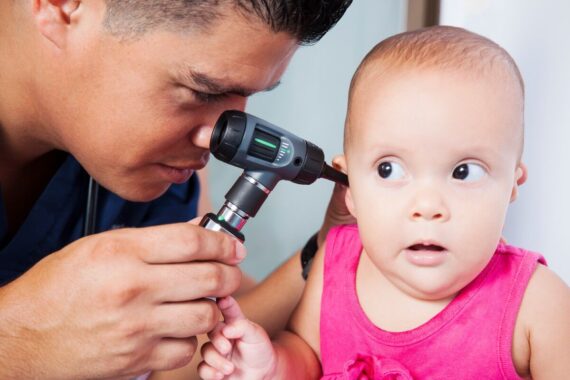Children with suspected glue ear should be referred straight away for a formal hearing test because of the impact the condition can have on their day-to-day lives and development, updated draft NICE guidance has said.
This should start those with suspected glue ear on the right pathway more promptly, but given the fluctuating nature of the condition, audiology services should also offer direct access for patients who have been discharged if they have concerns in the future, NICE said.
The guidelines also state that children with glue ear who do not have hearing loss do not need any treatment but more care should be taken in listening to the concerns of parents and taking into account the impact the condition is having on their child’s quality of life.
There is uncertainty in primary care on how to best diagnose and manage otitis media with effusion (OME) and when it does not resolve on its own it can have a significant impact on the day-to-day activities of the child, the recommendations noted.
GPs and other healthcare professionals should be aware that children with the condition can present with a range of issues including with hearing difficulties, indistinct speech or delayed speech and language development, frequent earache and tinnitus and potentially behavioural problems.
‘While there are costs associated with better and earlier recognition of OME there are also likely to be offsetting savings given the benefits of prompt recognition to expedite interventions and management that will improve health related quality of life and educational and developmental outcomes,’ the committee found.
Those with hearing loss in both ears should be reassessed every three months and the same considered for those whose hearing loss is confined to one ear.
Oral or topical antibiotics should not be prescribed for the condition said NICE because the potential benefits do not outweigh the risks associated with their use.
Likewise, steroids antihistamines and decongestants should not be prescribed, NICE said because of a lack of evidence of benefit.
Other medications to avoid in the treatment of glue ear with or without hearing loss include leukotriene receptor antagonists, mucolytics, proton pump inhibitors and reflux medicines, they added.
‘Children who have OME without hearing loss do not need treatment. However, the committee felt that it was important to clarify why it is not needed to these children and their parents when explaining this to them, as it may be a source of confusion or anxiety.
‘It was also agreed that it would be helpful to remind children, parents and carers that they can always return for more advice if they have concerns about hearing loss in future.’
Temporary hearing aids may be considered as an alternative to grommets in some children the guidance said but where surgery is chosen adjuvant adenoidectomy should be considered at the same time.
Pulse October survey
Take our July 2025 survey to potentially win £1.000 worth of tokens













interesting how things change. NICE now says refer straight away. Many years ago these children all had grommets and sometimes Ts and As . Then the evidence said that long term scarring may be a bigger risk than short term gain and most glue ear resolved ‘in the spring ‘ and no need to worry In between we were advised to suggest ‘autoinflation’. Now we are told do nothing and refer early and that parents can refer themselves back if worried.. Not sure about other areas but in kent this seems to not comment on the delays in ent services with current demand as well as rubbishing any role or skill a GP may have and the the use of watchful waiting
Nice is just a joke, isn’t it.
What a strange word to use – promptly. An ENT referral takes months and months, even if you write ‘urgent’ somewhere. I’m guessing they don’t mean under a two week wait pathway.
Quite apart from the evidence supporting early referral, when will Pulse eventually show a picture of the correct examination technique? This babe’s next stop could easily be in A&E with a bleeding ear and/or central tympanic perf followed by surgery and a clinical negligence claim by the parents.